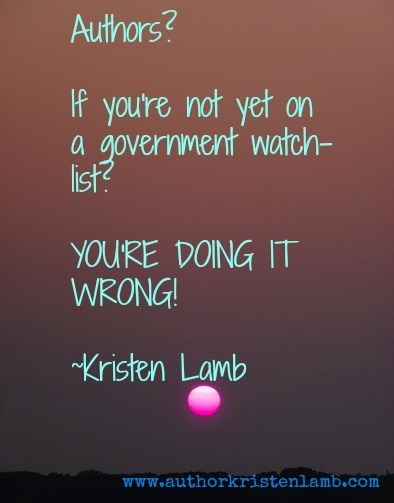Kristen Lamb's Blog, page 73
September 6, 2013
Tips to Make Us Stronger Authors—Both Fiction & Non-Fiction—Part 2
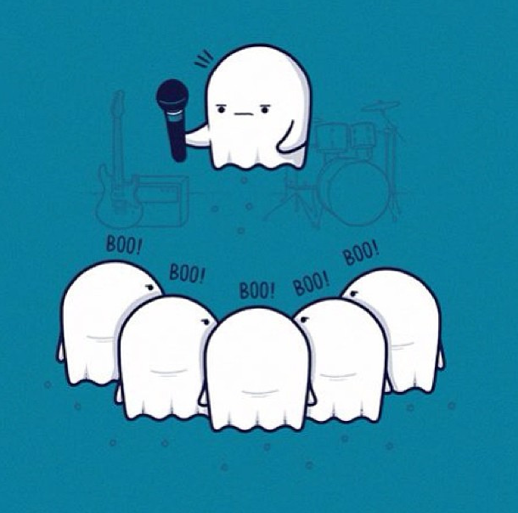
Image via Flikr Creative Commons, courtesy of Sin Amigos.
Yesterday, WordPress (for some reason—I suspect evil elves) published my notes and many of you were sent my “Blog Haiku.” For those who missed it? Here it is:
Fill a Need
Go Niche
Get a Thick Skin
***
Now to expound…
Non-Fiction and Fiction Authors Have Similar Goals
Good non-fiction informs and entertains. Fiction entertains and fills an emotional vacuum.
Fill a Need
If we are writing non-fiction, the first thing we need to ask, is “What need is this filling?” Do people need to learn how to eat healthy, heal from divorce, manage time, balance their checkbooks? Do they want to understand and explore information left out of the history books? Do they want an informed opinion about economics, politics, or disease? Do they have a need to be intellectually stimulated?
Maybe readers want to learn about a subject that is beyond their intellectual grasp. I love documentaries about astrophysics, but whenever the alphabet (particularly the GREEK alphabet) enters MATH? I’m lost.
Doesn’t mean I might not be interested in sub-atomic particles and The Big Bang. I love writers skilled enough to take an unintelligible subject and then (through their writing) enable me to connect, understand, and appreciate something so complex.

Image via Flikr Creative Commons, courtesy of NASA.
Whenever we contemplate a subject, we must remember we are selling a product.
Secret Deodorant fills my need to smell nice at the gym and not offend those close (or sweat through my blouse and embarrass myself). A nifty car fills my need to travel from point A to point B, pay less for gas and have a sensor that tells me I’m about to run over the neighbor kid’s bike.
Insurance fills a need to prepare and feel secure that, if and when disaster strikes, I have a company watching my six and promising to make things right. Febreeze fills a need to make my home smell like autumn leaves. In Texas, this is an important need because in September, it is still 100 degrees and I need some promise it is REALLY fall.
With fiction, we are filling emotional needs. A need for excitement, adventure, love, intimacy, triumph, closure, healing, or even escape.
Go Niche
In non-fiction, this is particularly important, especially in the beginning. When we go niche, we minimize competition. We can establish expertise, grow deep roots and gain authority. Eventually, if we desire, we can use the niche success to broaden our platform.
For instance, when I started blogging about social media, I was trying to be like other experts because I was new and insecure.
Then I noticed the tactics other experts were teaching weren’t very author-friendly. Most of us aren’t IT people or power-marketers. Also, many of the experts were speaking to businesses who could simply employ someone to do their social media.
The owner of the business wasn’t in charge of creating the product, too.
Thus, I went niche. I made my content different and for a very specific audience—writers. Sure, WANA methods actually work for any small business. They are ideal for artists, photographers, stylists, lawyers, and any profession where the owner is required to also produce the product/service and lacks a department to delegate social media duties.
Yet, I remained focused on writers. One day I might expand. That’s the plan. But if I’d tried to compete with Guy Kawasaki in the beginning, I’d have been in a losing battle. I picked a field I could cultivate.
I defined my audience and dedicated everything I had into serving, informing, preparing and entertaining THEM.
If I want to write a diet book, a diet “that works” is a lot of competition. But what about a diet book for the woman who is breast-feeding and wants to lose weight, feel better, combat post-partum depression naturally and have a waistline again?
Niche.
This same principle applies to fiction. Many new writers are hesitant to pick a genre. We want to write a book everyone loves. In trying to please everyone, we please no one. Focus is key with fiction. Ask what you want your readers to feel and then focus on that. It will make your writing tighter and it will give it a greater chance of connecting to a willing audience.
We all recognize pizza in all its amazing and varied forms. Some weird casserole with a fancy name? Might taste better, but the pizza is an easier sell. Pizza CAN be creative. Yes, we can blend genres and use artistic abilities to offer “same but different” yet there needs to be a grounding point or audiences are left scratching their heads saying, “I know you SAY it’s good…but what IS it?”
Look for the vacuums. Demographics not being served. This is why I am so excited about Baby Boomer Romance. Still fills a need (love, excitement), it’s recognizable (romance), but it’s different. It can appeal to the 58 year-old who wants to read about a woman in her age group finding love.
Get a Thick Skin
Whether we are writing non-fiction or fiction, this is imperative. There are people out there who have nothing better to do than tear others down. Yes, I’m excited to now be blogging for The Huffington Post. It was a wonderful promotion as NF expert. Yet, a new level, new devil. I can’t moderate comments, and it didn’t take long to get the comment bashing me for using the word “Awesome.”

Um…thanks.
I used the word “awesome” ONCE, so I am guessing this is now a word banned from the English language? And I wonder if the commenter realizes she doesn’t look smart, just like a jerk. It took practically duct-taping myself in another room not to respond:
Awesome comment. It’s awesome you could take the time to make such an awesome observation. It’s awesome feedback like this that makes future blogs even MORE AWESOME. Thanks for being AWESOME.
But this goes with the territory *shrugs*.

Image via Flikr Creative Commons, courtesy of Paul Hudson
Fiction authors? You cannot please everyone and if you try to? You start wearing your underwear on the outside of your clothes and take up collecting beer cans in a stolen Wal Mart cart as a hobby. Just don’t go there.
Fiction is subjective, so probably far more vulnerable.
One person LOVES description, and another hates it. One person LOVES lots of subplots, and others are confused. Just hone your craft, put out the best work you can and keep moving. Many of the bullies out there have been bullies since they were in fourth grade teasing the poor kid with the KMart clothes and a lisp.
Look at the bright side, we could be THEM.
What are your thoughts? Have you been on the other end of a bully? A Goodreads bully? Did you use duct tape to keep from hunting them down and burning dog poo on their porch? In your writing, has going niche offered focus? Do you have a clear vision of the “needs” your works should be filling?
I love hearing from you!
ANNOUNCEMENTS:
Winner of 20 page edit. Troy Lambert. Please send your 5000 word Word Document to kristen at wana intl dot com.
Since it was such a HUGE success and attendees loved it, I am rerunning the Your First Five Pages class SATURDAY EDITION. Use the WANA15 code for 15% off. Yes, editors REALLY can tell everything they need to know about your book in five pages or less. Here’s a peek into what we see and how to fix it. Not only will this information repair your first pages, it can help you understand deeper flaws in the rest of your manuscript.
My new social media book, Rise of the Machines–Human Authors in a Digital World is NOW AVAILABLE. Only $6.99.
WANACon, the writing conference of the future is COMING! We start with PajamaCon the evening of October 3rd and then October 4th and 5th we have some of the biggest names in publishing coming RIGHT TO YOU–including the LEGEND Les Edgerton.
If you REGISTER NOW, you get PajamaCon and BOTH DAYS OF THE CONFERENCE (and all recordings) for $119 (regularly $149). Sign up today, because this special won’t last and seats are limited. REGISTER HERE.


September 5, 2013
Tips to Make Us Stronger Authors—Both Fiction & Non-Fiction

Image via Flikr Creative Commons, courtesy of Mark Roy.
For those confused, WordPress has been possessed this week and for some reason published some notes I’d saved in a DRAFT. Sorry for the confusion.
Anyway…
Becoming a non-fiction author has a number of steps. After having written both fiction and non-fiction, I don’t think one is easier than the other. There are unique challenges to both. Yet, I will say that even novelists can benefit from the same tactics employed by good NF authors.
Like fiction, there’s seemingly infinite variety of types of non-fiction. There’s self-help, narrative non-fiction, informational non-fiction, and on and on. Much of being successful in non-fiction (and fiction) is finding your audience, then developing your voice and then marrying your voice to a style that suits you.
Think Like a Journalist
A friend of mine, Author Caitlin Kelly, is the one who pointed this out to me, and she is an amazing and successful journalist and NF author who has a fantastic blog-–a vast treasure for all kinds of writers. She’s gruff, tough, and knows her stuff  . If you want to ROCK non-fiction? She’s a priceless guide.
. If you want to ROCK non-fiction? She’s a priceless guide.
I’d been doing this “thinking like a journalist” thing for some time, just wasn’t particularly aware of it (until Caitlin made the observation). Journalists pay close attention to the world around them, collect, analyze and see patterns.
This is why good NF is more than just a glorified term-paper. We collect data, facts, information, opinions, then fashion them together into something uniquely our own that serves our audience. NF is less about listing pages of facts and studies. Leave that to the doctoral theses.
Journalists search for facts then tether those facts to the human story and assign relevance.
Novelists can learn from this tactic, too.
Where do you think so many of the best-selling story ideas come from? Many are birthed from headlines, history books, or human experience…then placed into story form. Fiction authors don’t have to pull ideas from the ether. The world abounds with stories if we pay attention.
Research can help with theme.
I recently helped a new writer plot her trilogy, but the underlying themes (though a fantasy) were essentially the injustice of slavery and sex-trafficking. These are two hot issues that have plagued humanity since the dawn of time. How much richer can a fantasy about slavery be if the author immerses herself in the sociological and psychological issues surrounding the topic TODAY (on planet Earth) then threads those motifs into her world?
Do Our Homework (Even When It’s Hard)
In my new NF book, Rise of the Machines—Human Authors in a Digital World, I easily read almost 8,000 words of other people’s research. Some of it was fun to read (I LOVE anything by Seth Godin and Neil Postman). Others? Real brain-benders. The Gutenberg Galaxy—The Making of Typographic Man was a the toughest 293 pages on my life, but Marshall McLuhan’s work was pivotal to the message I longed to convey.
The message is the medium and society cannot help but be influenced by technology.
I read exhausting works about neuroscience, the changes in the biological structure of the human brain over the centuries (due to technology shifts) and then, how this in turn, influenced society and economics. Why? Because I wanted to support why I don’t believe in relying on spam, ads and traditional marketing. I needed evidence that empirically demonstrated my contention that modern humans have literally learned to “un-see” such things (then offer solutions as to what humans would see).
Sure there are non-fiction books out there that thread together a bunch of fluff, glitter and opinions. But if we want to be a mark above? We must know our stuff.
This applies to novelists as well.
I once tossed a romantic suspense across the room because the author had the protagonist “putting the safety on a revolver” (which is an interesting trick since revolvers don’t have and never have had a safety). If there are guns in your book and you’re being specific? Understand how that gun works. Go to a shooting range. Ask questions like a journalist would.
Yes, I am notorious in movies for counting rounds.
Wow, a Magic Glock. He shot 35 rounds and never had to reload. Where can I get one of THOSE?
For Non-Fiction AND Fiction, The Devil is in the Details
I’ve read many samples of thrillers with military characters, but the characters were saying things they wouldn’t say and doing things that anyone trained to be a SEAL, a Green Beret, a military contractor or even a mercenary simply would never do. I’ve read about victims shot by a high-powered rifle with a small bullet-wound to show for it.
Um, said victim would likely be a red mist.
There’s a difference in gunshot wounds from a full-metal-jacket round as opposed to a hollow-point round, and, if we have this stuff in our books? Better nail the facts. Our reading audience (likely military people, law enforcement, or people who know/like guns) are reading and they can spot when we fail to do our research.
Years ago, I had a writer with a futuristic thriller/spy novel. He tried to “make up” a futuristic weapon, yet there was no making him understand that the caliber of his made-up weapon made it a ROCKET LAUNCHER. A little research and he’d have known that caliber is the diameter of the bullet. Want to write futuristic stuff and create futuristic weapons? Subscribe to Popular Science and Popular Mechanics and READ.
Tear out articles and file them away to refer to later. Bookmark useful web pages. Learn to use OneNote.
Have spree killers, hustlers, serial killers, thrill-killers, arsonists, manipulators, narcissists, sociopaths or sex-addicts in your book? The DSM-5 is your new best friend (and can be helpful for family reunions, too  ).
).
This professional reference can add dimension (and validity) to our characters. Research teaches us their behaviors, patterns and progression. For instance, someone who’s raped and killed women will only escalate. He will not deescalate back to being a Peeping Tom. He also won’t suddenly switch from murdering prostitutes to robbing banks. Different M.O. Different psychological profile.
Whether you write non-fiction or fiction, research is key. Read, subscribe to periodicals, read blogs and don’t be afraid to ask experts. Many are happy to help writers get the facts straight. The FBI has a page just for writers. There are also some fabulous reference tools out there. Look to cool guides like Deadly Doses–A Writer’s Guide to Poisons (and the rest of the series—AWESOME stuff!).
What have been some of your best resources? Have you had trouble finding where to go to find the information you need? Do you get frustrated with incorrect details? Is there a white panel van parked in front of your house, too?
I love hearing from you!
ANNOUNCEMENTS:
Since it was such a HUGE success and attendees loved it, I am rerunning the Your First Five Pages class SATURDAY EDITION. Use the WANA15 code for 15% off. Yes, editors REALLY can tell everything they need to know about your book in five pages or less. Here’s a peek into what we see and how to fix it. Not only will this information repair your first pages, it can help you understand deeper flaws in the rest of your manuscript.
My new social media book, Rise of the Machines–Human Authors in a Digital World is NOW AVAILABLE. Only $6.99.
WANACon, the writing conference of the future is COMING! We start with PajamaCon the evening of October 3rd and then October 4th and 5th we have some of the biggest names in publishing coming RIGHT TO YOU. If you REGISTER NOW, you get PajamaCon and BOTH DAYS OF THE CONFERENCE (and all recordings) for $119 (regularly $149). Sign up today, because this special won’t last and seats are limited. REGISTER HERE.


September 4, 2013
In the Age of Lightning Speed, How Can Writers Keep Up?

Image via WANA Commons, courtesy of Michael Siward
The Digital Age is moving at light speed and there is a new frontier WANA has set out to conquer—the writing conference. First, let me say there is no exact substitute for face-time, for an in-person conference. Yet, just because there isn’t a substitute, doesn’t mean there couldn’t be a supplement.
Publishing is transforming rapidly. Back in 2007, it didn’t matter if we could only make one, maybe two conferences a year. Publishing hadn’t changed all that much in a hundred years. Now?
Don’t…blink.
Facebook rearranges the digital furniture quarterly. Each social platform is constantly adding new features and removing old ones. Don’t get me started with algorithms. How do we use CreateSpace? How do we know what publishing option is best or even how to get started? Some of us don’t learn so well from books. We need face-time with good teachers and professionals who know what they’re doing because they’ve done it.
The Face of the Modern Writer…Times are a Changin’
Who is the modern writer? He looks a lot like the retiree on a fixed income, the mom juggling two jobs, or the Stay-At-Home Dad scrabbling for all the freelance work he can get so he has the joy of being with his children.
In a corporate culture that frowns on taking vacation (and is often stingier than Ebeneezer Scrooge with days off) how realistic is relying on a traditional conference? The economy is suffering and our money no longer goes as far.
Travel is now nothing short of a nightmare.
Arrive an hour and a half early. Get half-undressed. Wait for the TSA to swab snacks for bomb residue, and hope to GOD the plane doesn’t have mechanical issues because, with fewer planes in the air? We might not even make our destination.
Even if a conference is priced reasonably, air travel, parking, food, hotel, and time off work (and possibly babysitting) add up quickly. A $200 conference can become $1000 out-of-pocket quickly (or more).
Many writers have disabilities or health issues. Doesn’t mean they can’t write like the wind, but travel is a beating. I was once stranded in San Diego Airport for 15 hours with nothing to eat—made it home at almost SIX in the morning. Imagine if I was over 65 or in a wheelchair?
DELTA banned me from flying back in 2002 because I “was drunk” and stranded me in Atlanta. I wasn’t drunk, they’d checked the wrong bag, the one with my anti-convulsive medicine and then refused me access to my bag. I wasn’t drunk, I was having complex partial seizures (which slur your speech and affect balance). I’ve been a disabled person flying and it is NO picnic (and I boycotted DELTA for years over this).
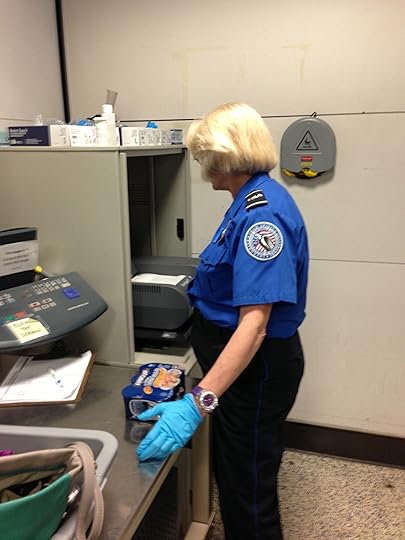
I KID you NOT. They are checking my Vienna Sausages for bomb residue.
Finding someone to take our kids for three to five days? A challenge even for the best of us. And though the conference is almost always an enjoyable experience, the travel alone can leave us feeling as if we’ve been tossed in a bag of hammers and shaken.
Thus, I started thinking about all the writers who were falling through the cracks, the ones in financial straits, the ones with physical or health limitations, the ones who were older, the writers who couldn’t easily get days off or find reliable childcare. Then what about the emerging markets in the UK, New Zealand, Australia? These countries have writers, but very few conferences. How realistic was it to expect someone to fly to the US from AUSTRALIA? Was it even necessary anymore?
In short? NO.
The Answer? WANACon
WANACon isn’t a glorified blog tour with a chat on Twitter. It isn’t a series of prerecorded classes. WANACon is the closest one can get to the REAL conference experience without leaving home. We had our first WANACon last February and it was AWESOME. I could make dinner and change diapers while listening to NYTBSAs teach me how to better my craft.
We had writers from Australia, New Zealand, the UK, Canada, Arab Emirates, all over the continental US and all in ONE PLACE…making friends and learning  .
.
I could ask questions and interact real-time. For anything I missed? Recordings were (are) provided. I could lie in bed eating dinner and enjoy a nice glass of wine while learning about publishing contracts.
In a word? HEAVEN.
We are holding another WANACon October 3-5. The 3rd will be an evening session with me to launch and we affectionately call it PAJAMACON. PAJAMACON is to familiarize you with the virtual classroom (which was designed to home-school children and is super easy) and make sure we can head off any tech issues before the start of the conference.
Then, the next two days? DUAL classrooms packed with the best of the best. NYTBSAs, USA Today Best-Selling Authors, award-winning authors, best-selling INDIE authors, top social media experts, e-book and web site experts, and even AMAZON will be there. I kidnapped recruited the head of CreateSpace to present. Some are returning speakers with new content and some are brand new presenters.
The coolest thing about all of them? They are freely offering their time to help writers and reinvent the writing conference.
All from home and now BOTH DAYS for $119.00 (Early Bird Special). We will have the official schedule posted this week, because eventually you guys can choose to attend PAJAMACON with BOTH days or PAJAMACON with the day of your choice. Yet, with the special? It’s $20 more and you get PAJAMACON and both days, so why not enjoy a few less Frappucinos and enjoy a REAL conference, the ENTIRE conference, from HOME?
TSA pat-downs can be provided, but they work for tips  .
.
Hope to see you guys there, and contest winner for my monthly drawing will be announced Friday.
For those who attended WANACon, share your experience. Are you guys excited about trying something new? A conference that comes to you? For an idea of how WANACon looks/operates, check out this blog from February.


September 3, 2013
The Rise of Individuality—What This Means for Publishing & Authors

Original image via Flikr Creative Commons, courtesy of Larry Lamsa
We’re now into the Digital Age, and the ramifications of a connected world are still being revealed daily. But, there’s one trend I’d be hard-pressed to argue with. The 20th Century was all about homogeneity. Madison Avenue flourished by telling us which clothing brands made us cool, which car made us special, what foods were “healthy.”
Information was controlled by gatekeepers and commodities restricted by retailers, thus homogeneity was the goal. Homogeneity was simpler and required less paperwork and thinking.
Generations bought Wonderbread because it was “fortified with vitamins” and “good for your kids.” In 1986? Hope you liked stirrup pants. There was a cultural need to “fit in” and be like everyone else, especially those who were the “cool kids.”
“Pillars of Same” Go Crashing Down
With the advent of the Internet and widespread use of social media, homogeneity is crumbling. Individualism is now revered more than ever in human history. And, no matter how weird, off-beat, or All-American we want to be? There is a subculture to embrace our style. Mega-trends have lost their power.
Today, changing lifestyles, the Internet, the balkanization of communication, and the global economy are coming together to create a new sense of individualism that is powerfully transforming our society. ~Microtrends, Penn/Zalesne
What this means is that, as consumers are faced with more and more choices, they’re segregating themselves into smaller and smaller subgroups. Love tattoos? Duck Dynasty? Duck Dynasty tattoos?
Can’t get enough of Jackson Galaxy and cat whispering? Are you Stay-at-Home-Mom who kicks butt on a Roller Derby Team each Saturday? It’s all out there, and most of us are a unique mixture that can’t easily be categorized.
For instance, yesterday I began my day with green juice and 50 minutes of yoga. I ended the day watching my husband reload ammunition while we watched Duck Dynasty and I prepped the grill. We also debated briefly over which superhero we were.
Actual Conversation in Our House:
Me: I’m so happy I had a boy.
Hubby: Why?
Me: Because the world needs more good guys. In fact, you’d be a really dull superhero. You’re Superman. All paladin. No baggage.
Hubby: I am SO not Superman. I call Green Lantern.
Me: Green Lantern didn’t have baggage either. Not like Batman. You don’t have enough drama to be Batman.
Hubby: As long as I’m not Aquaman.
Me: I’m Poison Ivy. Or Harley. You good guys are suckers for chicks with drama.
And what all of this means is that 20 years ago, we knew which table to sit at–Jocks, Preps, Nerds, Geeks, Good Kids, Band Kids, Kid Who Smells Like Old Carpet. The lines were clearer, namely because we had only a handful of networks and limited retail outlets to define our identity.
Now? We have the reins of individual freedom and we like it.
What Does This Mean for Publishing?
Big publishing has a number of limitations. First, their size. Second, massive overhead. Third? 20th Century thinking. They have to find the mega-trend to stay in business, but what does this mean in a marketplace that is rapidly shifting to micro-trends?
NY is less able to spot the micro-trends, because in a world of algorithms, numbers and spreadsheets, one relies on the past to predict the future. Business is always looking backward in order to move forward. It’s like trying to drive our car using the rearview mirror as the main guide. Says a lot about where we’ve been, but gives limited information as to what’s ahead.
Indies Have Revealed the Micro-Trend
We’ve talked about the Fifty Shades of Grey phenomenon, yet I will point out that I’ve met agents who turned down the manuscript. It was through E.L. James’ massive volume of independent sales that the micro-trend surfaced and then NY could turn this success into a mega-trend. A genre which received little to no attention has grown exponentially.
This was one of the reasons I recommended NY create e-book divisions as early as 2009 (REAL e-book divisions, not vanity-press retreads). Find a good book, give it a chance and see if the trend emerged. If not? The product cost less to produce and the writer could earn a higher royalty.
Even if the book didn’t sell bazillions of copies, writers didn’t have to sell that many books to make a healthy living and be freed up to write more books. Now instead of NY banking the farm on finding the ONE mega-trend, they could reap the rewards of countless micro-trends.
Which is exactly what Amazon has been doing.
Amazon doesn’t need one author to sell two million copies (not that they are opposed to it), but they can easily have 20 or even a 100 authors sell two million copies. The money spends the same.
This is Why Social Media is Vital for Authors
Social media is vital for keeping our fingers on the pulse of the public (code for “readers”). We can use blogging to define our brand then use content to attract those who share our “subculture” tastes (which I teach how to do in my new book).
It’s the main reason it’s death to be the All-Writing-All-The-Time-Channel. That’s a one-dimensional subculture that is overfished and quickly grows stagnant.
Also, any writer worth his/her salt is interested in a lot of things. The more we feed our subculture, the healthier it becomes, and the more loyal. We are all seeking our peeps, our tribe, our “friends” in a world that has become explosively larger.
Small is the New Big (Thank, you, Seth Godin)
Modern humans are overwhelmed with the sheer volume of choices, and, as a response, we stick to what we know. Sure, in 1999 we LOVED the megastore because it was new and shiny. Almost fifteen years later? We’re tired of needing to hail a taxi at the Mega Wal-Mart because we forgot the ketchup on aisle 3 and are now in the school supplies on aisle 93.
We’ll pay a bit more to shop at the corner market who appreciates our love for Organic Raw Kombucha, GF hot dog buns, and foie gras. We can buy Wonderbread at a supermarket or go to the small boutique grocer that sells sprouted grains for those of us in the crowd of Wonder-Why-We-EVER-Ate-Wonderbread.
Everyone wins.
But to spot and nourish the micro-trend, we must be present. Micro-trends can earn us a healthy living. A single writer doesn’t need to sell as many books to keep the lights on as NYC does. Also micro-trends have the potential to grow up to be mega-trends. Spreadsheets can’t tell us as much as people can. And, trust me, people have a lot to say. Numbers can’t tell us as much about the future as relationships can.
What are your thoughts? Do you love a world where you can define your own style? Create your own genres? Mix in your varied interests? Have you met people on social media with similar hobbies that you’d never have met in person?
I LOVE hearing from you!
To prove it and show my love, for the month of August, everyone who leaves a comment I will put your name in a hat. If you comment and link back to my blog on your blog, you get your name in the hat twice. What do you win? The unvarnished truth from yours truly. I will pick a winner once a month and it will be a critique of the first 20 pages of your novel, or your query letter, or your synopsis (5 pages or less).
ANNOUNCEMENTS:
Since it was such a HUGE success and attendees loved it, I am rerunning the Your First Five Pages class SATURDAY EDITION. Use the WANA15 code for 15% off. Yes, editors REALLY can tell everything they need to know about your book in five pages or less. Here’s a peek into what we see and how to fix it. Not only will this information repair your first pages, it can help you understand deeper flaws in the rest of your manuscript.
My new social media book, Rise of the Machines–Human Authors in a Digital World is NOW AVAILABLE. Only $6.99.
WANACon, the writing conference of the future is COMING! We start with PajamaCon the evening of October 3rd and then October 4th and 5th we have some of the biggest names in publishing coming RIGHT TO YOU. If you REGISTER NOW, you get PajamaCon and BOTH DAYS OF THE CONFERENCE (and all recordings) for $119 (regularly $149). Sign up today, because this special won’t last and seats are limited. REGISTER HERE.


August 30, 2013
Digital Age Authors & The Ugly Truth About “The Good Old Days” of Publishing

Image via Flikr Creative Commons, courtesy of Mike Licht.
I travel all over the country to teach writers how to create a brand and build a platform, and it never feels like work because I love preparing each of you for success. Yet, every audience has at least one (usually at least three) of a certain type of writer— the one who resents having to use social media. And they almost always sit in a spot where they can glare at me and interrupt and tell me I have the brain of a monkey who’s head was crushed in Wal Mart’s automatic doors.
Hey, can’t please everyone.
I Didn’t Make the Rules
Every industry has been modernizing since the advent of, I dunno…BUSINESS. Farmers relied on horses and plows until a seriously cool invention, THE TRACTOR. Scribes were a tad ticked with the invention of the printing press, and anyone who worked in an office in the 80s eventually had to learn to use a copy machine, then a computer.
Time marches forward and so does technology. Griping about it just wastes time and creative energy, and the “Good Old Days” weren’t all that great, at least not for most writers.
Ugly Truth About “The Good Old Days”
The old paradigm of publishing resembled a Banana Republic economy. About 5% made boatloads of money. Another small fraction made a decent living, but most scraped by and never made enough money to write full-time. As of 2004, only one out of NINE traditionally published authors ever saw a second book in print and 93% of all books published (traditional and non-traditional) sold less than a thousand copies (per Book Expo of America statistics).
Also, traditional publishing (sans social media) had a LOT of limiting factors.
Genre Hostages
First, if a writer experienced success in one genre, this writer was required to write that genre until he burned out or died. Why? The only way an author could create a brand was the books. Readers followed the genre.
Yet, when an author builds a social media platform, the author becomes the brand. Audiences follow the writer and his/her voice. Since they feel they “know” the author, they are far more likely to read out of genre. Maybe they’d never read a historical romance, but they love the writer so much, they’ll give HERS a try.
Age Discrimination
In the old paradigm, age was also a huge limitation. Agents were hesitant to sign up a seventy-year-old writer for a three-book deal. Yet, this doesn’t jive with reality.
Boomers reinvented youth in the 1960s and economic success in the 1980s; they are not about to do their senior years by someone else’s formula. According to a 2005 survey by Merrill Lynch, more than 3 in 4 boomers say they have no intention of seeking traditional retirement. ~Microtrends, Mark Penn, page 30.

Image via Flikr Creative Commons, courtesy of Ethan Prater
A large percentage of writers have waited until the kids are out of the home and out of college to begin pursuing their dreams of being authors. They’re also writing books they’d like to read. Romance novels with a sixty-year-old protagonist finding love, not a twenty-two-year-old. Is traditional publishing ready to invest in older writers writing drastically different books?
Maybe. But if not? Now there are options. Seventy is getting younger every day and the emerging e-commerce marketplace doesn’t care how old we are or how many books we write.
Good is No Longer Good Enough
I recently finished an amazing business book by Bob Pritchett, and this particular segment stood out for me:
We live in a world of abundant, affordable quality. The days of getting ahead by doing a good job, building a good product (writing a good book), or providing a good service are over. Your business needs to be exceptional in some way, or it is doomed to drift forever on the sea of homogeneity. Fire Someone Today, Pritchett, page 195.
Can a writer survive just writing books? Sure, humans can also stay alive eating grasshoppers and doodlebugs (though I have not tested this theory). I don’t know about you guys, but I’d like to do more than just survive. And, to be blunt, as the market shifts toward globalization and e-commerce, writers who don’t make the transition will eventually go extinct.
Just ask Martha. She used to work retail and refused to let go of carbon paper machines when taking credit card transactions. Word on the street is Martha was last seen eating grasshoppers.
The Steep Price of Stagnation
For the first time in human history, authors are making six and seven figures without New York’s involvement. More writers are able to write full-time because they’ve embraced innovation. When we just want to write books we hand off a lot of work to other people. This means a lot of people get paid before WE do.
In the traditional paradigm, an author makes about $1.07 (before taxes) on a $10 book. Why? Because the marketing department, sales department, literary agents, bookstores, and truck drivers don’t work for Skittles. Barnes & Noble is a business, not a charity, and they expect payment for placing our books on their shelves.
If we want to traditionally publish, we can. We just have to sell A LOT more books to make good money. How do we do this? We need a brand and a platform that is capable of driving sales. Jenny Lawson’s book Let’s Pretend This Never Happened was traditionally published and hit the NYT best-seller list.
But Jenny Lawson is also The Bloggess and her blog has roughly 2-3 MILLION visits a MONTH. She also rules Twitter. When she tried to hold a “Meet the Author”? The sheer volume of her fans crashed Goodreads.
THAT is a noble goal. ***Note to self: Must crash Goodreads.
If we indie or self-publish? Readers don’t pop out of the ether. For the moment, traditionally published authors do have an advantage of being in bookstores. But, as I mentioned, a lot of other people need to be paid to make this happen. Indies do enjoy an advantage of making more money per book, but we need to step into a lot of those “outsourced” roles that gobble up the traditional author’s royalty check.
Yes, it’s more work, but it can be fun work. Selling more books means more money. More money means we get to do what we love for a living.
I’ve worked many years to create a system of building an on-line brand in a way that is fun, simple, and leaves plenty of time to write. WANA methods are also resistant to any major shifts in technology (changes in algorithms, Facebook going the way of MySpace).
I’m NOT a technophile and have almost no clue what most of the buttons on my dashboard actually DO. I’m a writer and I want to write…until I am 110 and then I’ve left instructions to be cryogenically frozen and then defrosted in the future  . I might even write Fifty Shades of Polydent just to embarrass my grandkids.
. I might even write Fifty Shades of Polydent just to embarrass my grandkids.
What are your thoughts? Are you an older writer who’s excited about the future? Do you like the idea of writing books you would like to read? Have you ever eaten a grasshopper and lived to tell the tale?
I LOVE hearing from you!
To prove it and show my love, for the month of August, everyone who leaves a comment I will put your name in a hat. If you comment and link back to my blog on your blog, you get your name in the hat twice. What do you win? The unvarnished truth from yours truly. I will pick a winner once a month and it will be a critique of the first 20 pages of your novel, or your query letter, or your synopsis (5 pages or less).
ANNOUNCEMENTS:
Since it was such a HUGE success and attendees loved it, I am rerunning the Your First Five Pages class SATURDAY EDITION. Use the WANA15 code for 15% off. Yes, editors REALLY can tell everything they need to know about your book in five pages or less. Here’s a peek into what we see and how to fix it. Not only will this information repair your first pages, it can help you understand deeper flaws in the rest of your manuscript.
My new social media book, Rise of the Machines–Human Authors in a Digital World is NOW AVAILABLE. Only $6.99.
WANACon, the writing conference of the future is COMING! We start with PajamaCon the evening of October 3rd and then October 4th and 5th we have some of the biggest names in publishing coming RIGHT TO YOU. If you REGISTER NOW, you get PajamaCon and BOTH DAYS OF THE CONFERENCE (and all recordings) for $119 (regularly $149). Sign up today, because this special won’t last and seats are limited. REGISTER HERE.


August 29, 2013
Focusing on the Positive and Why I Think DELTA Airlines Should No Longer Burn in HELL

Image via Flikr Commons and courtesy of Andrie Dimofte
I generally am a Pollyanna. Yes, it gets me in trouble sometimes, but I feel joy is a choice. I needed to remind myself of that yesterday. I’ve just returned home from Florida, and OY VEY what an adventure. I love my job, and helping you guys never feels like work, but the traveling can be…interesting.
A Tale of a Chronic Procrastinator
I knew I was going to be speaking in Florida, but in working my tail off to finish my new social media book, traveling, bed from hell.…buying my ticket was, er, um…put off. At the last minute I scored the cheapest ticket I could find on American Airlines. Ah…but there were two problems. Okay three.
Ticket was over $600. BUT it was with American Airlines. I’ve had a long-standing grudge against DELTA and have refused to give them ANY business. In fact, I’d kind of hoped they’d sink into Hell and burn. So I buy this horrible ticket. DFW to New Orleans, to Atlanta, finally to Melbourne, FL. Return flight? Same in reverse. Melbourne to Atlanta to New Orleans to DFW. Much to my horror? Once I arrived at the airport, I realized two legs of the trip were via Delta.
Grrrrr.
Why I Hated Delta
Years ago, I suffered barely controllable complex partial seizures (and that is a long story and I am perfectly healthy now). Yet, at the time, I was essentially epileptic. My health was deteriorating, my father had suddenly died, and Christmas was painful without him, so I decided to join some pals and go to the Bahamas for the holidays instead. The Bahamas were, blech, but on the return flight home, our plane had mechanical difficulties and had to be redirected to Atlanta.
Being a naive traveler, I’d packed my anti-seizure medication in the checked luggage (stupidly believing I’d be home in three hours). As we were being ticketed for other flights to get us home, I asked the ticket person if there was any way I could get to my bags. I could feel the anti-convulsive medication was wearing off and it was beginning to get a bit scary. She was NASTY to me and not only told me “No, but hell no. And go away for making me do my JOB.”
I went to complain to a supervisor, not only for the way the woman treated me, but that I REALLY needed my medication. The nasty ticket agent, knowing she’d been way out of line, stepped in and lied and told the supervisor I was drunk and combative and needed to be banned from any flights.
***I never drank alcohol, namely because it was contraindicated in the anti-convulsives.
Yes, my behavior probably seemed strange, namely because I was starting to have SEIZURES which made my balance off and I was slurring. So instead of taking pity on someone who was disabled?
DELTA stranded me in Atlanta, Georgia with no luggage, no meds, banned from flying and no way home.
An elderly couple found me crying in a hallway and took pity on me and made sure I got back to DFW. By the time I got home? I was in full seizures AND had pneumonia (because DELTA rerouted me through a FREEZING New Orleans with no jacket and no meds and I slept the night on cardboard boxes (from Christmas decorations) to stay warm.
I was ill for almost three months after this. Pneumonia is no picnic.
I wrote DELTA a letter telling them how I’d been treated and…nothing. Since then? I have had MANY opportunities to fly, but would rather take 16 connections through Trinidad Airways than give them any money. Thus, I was a tad ticked when I realized my oversight with my Florida purchase.
I’d have to fly with the Devil, um DELTA.
Twelve Years Must Make a Difference
Ironically, the DELTA flights were the best ones. In fact, on the way home, my connecting flight to New Orleans had mechanical issues and it was clear I’d miss my connection to DFW. What did DELTA do? They promptly and KINDLY put me on a direct flight to DFW. The crew was HYSTERICAL. I’ve never had a safety briefing that FUNNY. They went above and beyond and, I suppose after over a decade of hating their guts?
I forgive them…mostly.
I am generally not a person who holds a grudge. I have the memory of a tsetse fly with people. But with BUSINESSES? Hell hath no fury. For TWELVE years I’ve told anyone who’d listen NOT TO FLY DELTA THAT THEY WERE EVIL.
But I suppose people change and thus I suppose businesses change too. This last experience helped me forgive them (mostly) and I’ll maybe even give them another try. In fact, it was wonderful that the plane experienced mechanical difficulties and I was given a direct flight because, when I made it to my car?
The battery was dead.
Had I been delayed (not getting the direct flight), I have no idea how late I might have made it in. Hubby would OF COURSE come to the rescue, but would it have been ten or eleven at night (with a baby)?
And I’d like to say I handled the dead car in triple digit heat with grace. I didn’t. I cried. But once I calmed down and Hubby arrived, I realized what a rare and strange gift DELTA had given me. I made it in early enough for the problem to be resolved far more easily.
So, in all of this, I learned, happiness is a decision, not a destination. Forgiveness can come if we are open to it (AT&T doesn’t count). KIDDING! Life is all about perspective and which one we choose. Focus on the negative? Expect more.
My Tante (Aunt) Christine told me a fabulous parable.
A man wanted to move from one village to another. He stopped a resident of the new village and asked, “What kind of people live in this place?” The resident replied, “Well, what kind of people lived in the last place you lived?” The man replied, “Oh, they were terrible, cold and mean. They left me out of everything and were uncaring and cold.” The resident replied, “That’s the same kind of people who live here.”
A few days later, another traveler approached the same resident wanting to move. The resident asked, “Well, what kind of people live in your village?” The traveler replied, “Oh, everyone is SO nice. They are kind and caring and I always feel welcome.” The resident replied, “That’s exactly the kind of people here.”
Thus, I suppose the lesson is we get what we look for. Setbacks and delays can be terrible, but often? They have a silver lining. We create the world we want to see. DELTA did me very wrong, but they made it right this time and I’m open to forgiving them and giving them more business. Yes, my car was dead, but Hubby could be my hero and all of us could go to dinner together.
What are your thoughts? I prefer to keep things positive, but is there a business that so WRONGED you that you were their best BAD advertising…but then they made it right? Have you ever experienced a setback or tragedy, but in retrospect? It turned out to be the best thing that could have happened to you?
I love hearing from you!
ANNOUNCEMENTS:
Since it was such a HUGE success and attendees loved it, I am rerunning the Your First Five Pages class SATURDAY EDITION. Use the WANA15 code for 15% off. Yes, editors REALLY can tell everything they need to know about your book in five pages or less. Here’s a peek into what we see and how to fix it. Not only will this information repair your first pages, it can help you understand deeper flaws in the rest of your manuscript.
My new social media book, Rise of the Machines–Human Authors in a Digital World is NOW AVAILABLE. Only $6.99.
WANACon, the writing conference of the future is COMING! We start with PajamaCon the evening of October 3rd and then October 4th and 5th we have some of the biggest names in publishing coming RIGHT TO YOU. If you REGISTER NOW, you get PajamaCon and BOTH DAYS OF THE CONFERENCE (and all recordings) for $119 (regularly $149). Sign up today, because this special won’t last and seats are limited. REGISTER HERE.


August 28, 2013
Do You Have a Psychic Vampire Critique Partner?

WHAT do you MEAN I am head-hopping? THAT is my VOICE. You are ruining my ART!
(Image via Carniphage Flikr Commons)
Several months ago, in my Enemies of the Art series, we discussed Psychic Vampires. Psychic Vampires are all around us, and likely, we will never be rid of them. PVs are most likely to show up at a number of critical junctures. They sense the energy shift, and since that energy is no longer all about them, they will fight tooth-and-nail to bring balance to The Force (of Manipulation).
While many of my posts are directed toward writers, most people have these same issues. If we don’t learn how to guard against and handle PVs, we will always be their victims. Psychic Vampires will always feel renewed and refreshed, namely because they just sucked the life out of their victims (us).
Psychic Vampires abound in the arts, and they’re also prevalent in many writing groups. They are vamps dressed in writer clothing. Often they are so self-absorbed they can’t even see the reality of what they are.
This is why confronting PVs is almost always fruitless and will simply lead to conflict that only further feeds them at our expense. Our best option is to be able to spot them, then ignore them or RUN.
Beware the Psychic Vampire Critique Partner
I wish I could give all of you a nice, easy website to find healthy, professional critique partners, but unfortunately those don’t exist. We will have to trust, then use trial and error, then set tough boundaries. Some CPs will make it, but likely most will not.
Why?
Too many writers get into this business for the wrong reasons. They really aren’t interested in the life of a professional and just enjoy “playing author.” Writing is for attention and ego-stroking. Their goals are about THEM and this means anyone on board with them will go the wrong direction.
They will keep steering the ship the wrong way…toward the rocks.
Some PVCPs are touchy, sensitive and unwilling to learn and grow. Mistakenly, they believe that their art is just genetically coded into their DNA and that any feedback is just trying to sabotage their “art.”
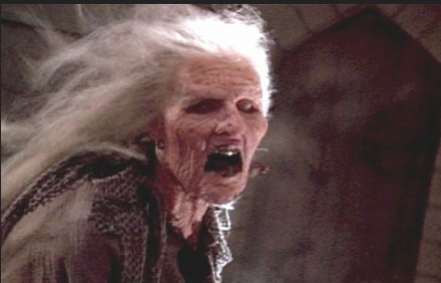
What do you mean too many flashbacks? YOU ARE SO MEAAAANNNN!
If you have a critique partner who refuses to listen to honest feedback. If she is touchy and oversensitive? Move on. You won’t grow. You’ll spend too much time propping up an ego that can never get enough propping up. The PV will be a continual vortex of need and if you don’t jump ship while you can? Expect to crash on the rocks with them.
This writer won’t make it unless she changes, and if you’re enabling her to be a PVCP, why should she?
We Are Who We Hang Around
I cannot recommend attending writing conferences enough. Yes, even WANACon counts. We are having another WANACon the first weekend of October and deliver top tier NYTBSA talent right to you AT HOME. Right now we are having a special, the ENTIRE conference and recordings for $119 (which will expire soon). Just like a writing conference only no travel and at YOUR convenience.
We can arrange a TSA feel-up, but they work for tips  .
.
Anyway…
The reason we need to choose friends wisely and surround ourselves with professionals, is that these writers have invested cold hard cash into getting better. When we forge relationships with writers who are professional or stronger, we grow. Water will always find its level, so make sure you’re rising, not sinking. Habits are contagious. This is one of the reasons I cannot recommend joining an RWA chapter enough (even if you don’t write romance).
RWA is full of professionals who work their tails off and understand craft and the business. As iron sharpens iron, so one man sharpens the other. Refuse to be in a place that dulls your creative edges.
PVCPs Waste Valuable Time
I’ve been in critique relationships where the other person never learned to think for themselves. Why bother reading Story Engineering, The Writer’s Journey, Hooked, Save the Cat or Plot & Structure when we can get Kristen to so all our thinking/plotting for us?
I recall two members of a critique group who attended every week with their crappy writing to be critiqued. Instead of learning, they just barfed down junk on a page and let the group “fix” it. Odd thing was, after over a year of enduring the world’s worst writing, nothing changed. When these individuals self-published? NONE of the writing had changed.
This ticked me off. How many hours had we dedicated to helping, when the writer had zero intention of listening? The critique wasn’t a place to grow; rather, it was a captive audience who had to listen to their dreadful “story” vomit.
Most of us are short on time. We often have day jobs, kids, chores, bills and we have to do social media and MOST IMPORTANTLY we need to be writing more books and better books. It’s easier to tread water if we aren’t dragging a PVCP anchor around our necks.
The PVCP Test
1. Is the writer touchy. Does she want every bit of feedback to be handed with a box of chocolates?
2. Does she attend regularly? Or does she always have an excuse of why she can’t be there—great-nephew’s birthday party, helping a friend’s garage sale, washing her hair?
3. Does the writer actually READ? Does she read fiction and LOVE storytelling? I’ve met writers who claimed they wanted to be NYTBSAs, but said things like, “Well, I just don’t like to/have time to read.” Reading is FUNDAMENTAL to what we do. A writer who doesn’t read is like a musician who doesn’t listen to music. TIME WASTER.
4. Does the person give back? Critique partners should be partners. I’ve had writers who took and took for months. They wanted me to plot, then re-plot, then they had a new and BETTER idea they needed “help” plotting. Never once did it occur to them, that we hadn’t talked about my book in months.
5. Does this person ever grow? Or do they keep making the same newbie errors over and over? If they are? They aren’t listening, so move on. This is a PVCP. RUN.
What are your thoughts? Have you been the victim of a PVCP? What did you do? How did you handle it? What are your horror stories? How did you stake the PVCP? What might be some other ways to spot a PVCP? What might be some good resources for finding a good CP? I recommend trying WANATribe, join RWA or attend conferences. But, maybe you guys have some better suggestions!
BTW, Image number two courtesy of best movie ever Army of Darkness.
I love hearing from you!
ANNOUNCEMENTS:
Since it was such a HUGE success and attendees loved it, I am rerunning the Your First Five Pages class SATURDAY EDITION. Use the WANA15 code for 15% off. Yes, editors REALLY can tell everything they need to know about your book in five pages or less. Here’s a peek into what we see and how to fix it. Not only will this information repair your first pages, it can help you understand deeper flaws in the rest of your manuscript.
My new social media book, Rise of the Machines–Human Authors in a Digital World is NOW AVAILABLE. Only $6.99.
WANACon, the writing conference of the future is COMING! We start with PajamaCon the evening of October 3rd and then October 4th and 5th we have some of the biggest names in publishing coming RIGHT TO YOU. If you REGISTER NOW, you get PajamaCon and BOTH DAYS OF THE CONFERENCE (and all recordings) for $119 (regularly $149). Sign up today, because this special won’t last and seats are limited. REGISTER HERE.


August 27, 2013
When Is It Time to Start Building an Author Platform?
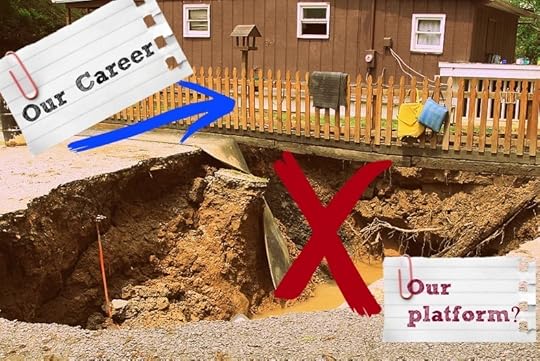
Original image via Wikimedia Commons, courtesy of FEMA
I spoke on Saturday here in Florida for the STAR folk in Melbourne, and I had a new writer comment that she couldn’t start building her platform because she had no finished books and nothing for sale. I don’t believe in Self-Help-Kitten-Glitter. I believe in hard work. But hard work needs a solid foundation or we’re no better than Skippy the Hamster running in his little wheel. We should strive to work smarter, not harder. That’s the WANA Way. WANAs also plan for success  .
.

Original image via Dan Derritt Flikr Creative Commons
Preparation
As writers, preparation encompasses a lot of things—craft books, classes, practice, workshops, writing, etc. Yet, today I’m going to narrow it to social media and author platforms. The day we decide to do this “writing thing” for real is the day we should begin building our platform. I cannot count the number of times authors have contacted me in frantic e-mails and said things like, “I have a book coming our next month and I need a platform.”
I’m Kristen Lamb not David Copperfield.
Tough Love First
Many of you have heard me say this, but it bears repeating. Screw aspiring. Aspiring is for pansies. Takes guts to be a writer. When we define ourselves as “aspiring writers” and not “professional writers” we can fail to do a lot of the early preparation that will be a foundation for a successful career.
Being a professional is a mind-set not a pay grade. Fail to plan and plan to fail.
A lot of new (pre-published) writers are hesitant to start building a brand an author platform because they don’t yet have anything for sale. Yet, strong platforms that are resistant to major technology shifts (*cough* MySpace*) and that have the capability to eventually drive book sales? Those don’t pop out of the ether. They take time to build.
Baby Steps are Steps
If we wait until we have a book deal or a published work for sale, we have to put far more energy into building a brand/platform, energy that is better served writing more books.
Think of it like losing weight. Say my high school reunion is coming and I’m fifty pounds overweight. I long to look my best when reuniting with my former peers. If I begin the year before the reunion making incremental changes and I slowly adopt steady, good habits, I can lose weight in plenty of time. I can cut out sodas, add in water and better foods, go for morning walks and lose 2-5 pounds a month and reach my goal.
But, there is always the option of waiting until three months before the reunion and having to hire a former drill sergeant to make me do cross-fit three hours a day. I can live off rabbit food or liquid diets to peel off the pounds. And sure, perhaps I could lose most of the weight, but is this a long-term lifestyle most of us can maintain unless we hold Jillain Michaels hostage in our basement?
When we begin building a platform early, we can make small steps over time that create a thriving community organically. We build slowly, creating deep roots. This makes it easier when the book is finally ready for sale, because we already have a thriving base of support. This takes off a lot of pressure and permits us to focus on writing more books. Also, we have regular healthy social media habits that are now simply part of daily life.
Having Nothing for Sale Can Be a Good Thing
When I started out on social media, I didn’t do it to sell anything. I knew I’d have books and even classes or consulting for sale at some point in the future, but just wasn’t there. Because I wasn’t trying to “sell” something, interactions felt far more natural and others probably were more comfortable in my presence because they knew if I was chatting with them, it was to chat and connect. They weren’t bracing for the awkward, “buy my book” pitch.
Thus, when we are new, this is a great way to make friends, network and create community with far less emotional pressure all around. Also, if people have been connecting with us for a period of time and been along for the journey? Many are eager to support us when that first book is finally ready, because they feel they’ve been part of the process.
There is NEVER a “Bad” Time to Build a Brand and Platform
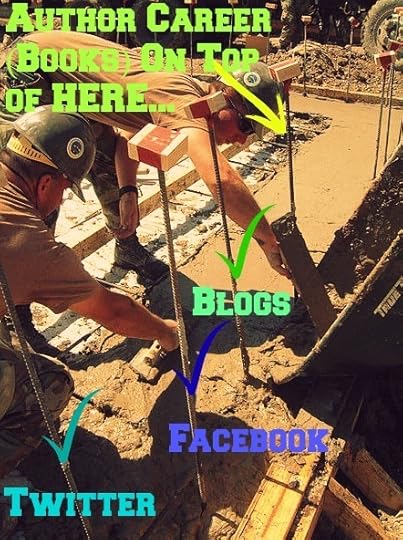
Original image via Wikimedia Commons, courtesy of the US Navy
If you’re an author who’s published and has books for sale, you are fine. Just remember it will take some time for your platform to gather strength. This is why WANAs work together. We help one another, much like an Amish barn-raising. Together, we are stronger. Yes, we need to build a platform, but no one ever said we had to do it alone.
Yet, on the other side of this spectrum, don’t buy the lie that you can’t start building a platform until you’re published. Those who start as early as possible have major advantages. Social media is fantastic for pre-published writers because you can 1) network with other writers 2) learn the industry 3) learn to meet self-imposed deadlines.
Case in Point
I often talk about Piper Bayard and how her original book was a nightmare when she hired me to edit (back when I used to do that kind of work). While we were repairing her book, Piper listened to me about social media. She began to blog and learned to use Twitter. She whined a lot, but did it anyway  .
.
*waves at Piper*
When she finally was picked up by a publisher, she was offered a far more favorable deal because she had a strong platform. Also, through networking on Twitter, Piper was able to meet big-time authors and befriend them (she had nothing for sale). Later, when it came time to find blurbs for her first book, she didn’t even have to ask. Authors she knew were already offering.
Her book Firelands has hit multiple best-seller lists, received rave AP reviews, and she now has a three-book deal. Much of this was possible because Piper adopted the attitude of a “professional” early and laid the groundwork for future success. She understood the business of the Digital Age Author involved more than merely writing a book.
Thus the answer to my question, “When is it time to start building an author platform?” The answer is NOW, no matter where you happen to be in your career. E-commerce is exploding as brick-and-mortar businesses are experiencing record contraction. Also, with social media, we have the ability to tap into emerging markets of eager readers and e-commerce is better suited to fill their demand for new books and good books.
My new book can help you, no matter where you are in your career or which publishing path you’ve chosen to take. You can even peruse this blog of all kinds of free advice. My sole goal is to help you succeed and realize your dreams.
What are your thoughts? Did you believe you needed a book before you started building a platform? Do you feel more at ease? Did you wait to the last minute and wish you’d done some things differently? What are your successes? War stories?
I LOVE hearing from you!
ANNOUNCEMENTS:
Since it was such a HUGE success and attendees loved it, I am rerunning the Your First Five Pages class SATURDAY EDITION. Use the WANA15 code for 15% off. Yes, editors REALLY can tell everything they need to know about your book in five pages or less. Here’s a peek into what we see and how to fix it. Not only will this information repair your first pages, it can help you understand deeper flaws in the rest of your manuscript.
My new social media book, Rise of the Machines–Human Authors in a Digital World is NOW AVAILABLE. Only $6.99.
WANACon, the writing conference of the future is COMING! We start with PajamaCon the evening of October 3rd and then October 4th and 5th we have some of the biggest names in publishing coming RIGHT TO YOU. If you REGISTER NOW, you get PajamaCon and BOTH DAYS OF THE CONFERENCE (and all recordings) for $119 (regularly $149). Sign up today, because this special won’t last and seats are limited. REGISTER HERE.


August 26, 2013
The Seven Deadly Sins of Prologues

Image via Flikr Creative Commons, via Mikko Luntiala
To prologue or not to prologue? That is the question. The problem with the prologue is it has kind of gotten a bad rap over the years, especially with agents. They generally hate them. Why? In my opinion, it is because far too many writers don’t use prologues properly and that, in itself, has created its own problem.
Because of the steady misuse of prologues, most readers skip them. Thus, the question of whether or not the prologue is even considered the beginning of your novel can become a gray area if the reader just thumbs pages until she sees Chapter One.
So without further ado…
The 7 Deadly Sins of Prologues
Sin #1 If your prologue is really just a vehicle for massive information dump…
This is one of the reasons I recommend writing detailed backgrounds of all main characters before we begin (especially when we are new writers). Get all of that precious backstory out of your system.
This is a useful tactic in that first, it can help us see if a) our characters are psychologically consistent, b) can provide us with a feel for the characters’ psychological motivations, which will help later in plotting.
I have a little formula: background–> motivations –>goals–>a plan–>a detailed plan, which = plot and c) can help us as writers honestly see what details are salient to the plot.
This helps us better fold the key details into the plotting process so that this vital information can be blended expertly into the story real-time.
Many new writers bungle the prologue because they lack a system that allows them to discern key details or keep track of key background details. This makes for clumsy writing, namely a giant “fish head” labeled prologue. What do we do with fish heads? We cut them off and throw them away.
Sin #2 If your prologue really has nothing to do with the main story.
This point ties into the earlier sin. Do this. Cut off the prologue. Now ask, “Has this integrally affected the story?” If it hasn’t, it’s likely a fish head masquerading as a prologue.
Sin #3 If your prologue’s sole purpose is to “hook” the reader…
If readers have a bad tendency to skip past prologues, and the only point of our prologue is to hook the reader, then we have just effectively shot ourselves in the foot. We must have a great hook in a prologue, but then we need to also have a hook in Chapter One. If we can merely move the prologue to Chapter One and it not upset the flow of the story? Then that is a lot of pressure off our shoulders to be “doubly” interesting.
Sin #4 If your prologue is overly long…
Prologues need to be short and sweet and to the point. Get too long and that is a warning flag that this prologue is being used to cover for sloppy writing or really should have just been Chapter One.
Sin #5 If your prologue is written in a totally different style and voice that is never tied back into the main story…
Pretty self-explanatory.
Sin #6 If your prologue is über-condensed world-building…
World-building is generally one of those things, like backstory, that can and should be folded into the narrative. Sometimes it might be necessary to do a little world-building, but think “floating words in Star Wars.” The yellow floating words that drift off into space help the reader get grounded in the larger picture before the story begins. But note the floating words are not super-detailed Tolkien world-building.
They are simple and, above all, brief.
Sin #7 If your prologue is there solely to “set the mood…”
We have to set the mood in Chapter One anyway, so like the hook, why do it twice?
The Prologue Virtues
Now that we have discussed the 7 Deadly Sins of Prologues, you might be asking yourself, “So when is it okay to use a prologue?” Glad you asked.
Virtue #1
Prologues can be used to resolve a time gap with information critical to the story.
Genre will have a lot to do with whether one uses a prologue or not. Thrillers generally employ prologues because what our hero is up against may be an old enemy. In James Rollins’s The Doomsday Key the prologue introduces the “adversary” Sigma will face in the book. Two monks come upon a village where every person has literally starved to death when there is more than an abundance of food.
Many centuries pass and the very thing that laid waste to that small village is now once more a threat. But this gives the reader a feel for the fact that this is an old adversary. The prologue also paints a gripping picture of what this “adversary” can do if unleashed once more.
The prologue allows the reader to pass centuries of time without getting a brain cramp. Prologue is set in medieval times. Chapter One is in modern times. Prologue is also pivotal for understanding all that is to follow.
Prologues are used a lot in thrillers and mysteries to see the crime or event that sets off the story. Readers of these genres have been trained to read prologues and generally won’t skip. The serial killer dumping his latest victim is important to the story. It’s a genre thing. Yet, still? Keep it brief. Reveal too much and readers won’t want to turn pages to learn more.
Virtue # 2
Prologues can be used if there is a critical element in the backstory relevant to the plot.
The first Harry Potter book is a good example of a book that could have used a prologue, but didn’t (likely because Rowling knew it would likely get skipped). Therese Walsh in her blog Once Before A Time Part 2 said this:
J.K. Rowling’s Harry Potter and the Sorcerer’s Stone is told in a close 3rd person POV (Harry’s), but her first chapter is quite different, told when Harry is a baby and switching between omniscient and 3rd person POVs (Mr. Dursley’s and Dumbledore’s). Rowling may have considered setting this information aside as a prologue because of those different voices and the ten-year lag between it and the next scene, but she didn’t do it. The info contained in those first pages is critical, it helps to set the story up and makes it more easily digested for readers. And it’s 17 pages long.
This battle is vital for the reader to be able to understand the following events and thus would have been an excellent example of a good prologue. But, Rowling, despite the fact this chapter would have made a prime prologue still chose to make it Chapter One so the reader would actually read this essential piece of story information.
Food for thought for sure.
Yes, I had Seven Sins and only Two Virtues. So sue me  . That should be a huge hint that there are a lot more reasons to NOT use a prologue than there are to employ one (that and I didn’t want this blog to be 10,000 words long).
. That should be a huge hint that there are a lot more reasons to NOT use a prologue than there are to employ one (that and I didn’t want this blog to be 10,000 words long).
Prologues, when done properly can be amazing literary devices. Yet, with a clear reader propensity to skip them, then that might at least make us pause before we decide our novel must have one. Make sure you ask yourself honest questions about what purpose these pages are really serving. Are they an essential component of a larger whole? Or are you using Bondo to patch together a weak plot?
But, don’t take my word for it. Over the ages, I’ve collected great blogs regarding prologues to help you guys become stronger in your craft. These are older posts, but timeless:
Once Before a Time: Prologues Part 1 by Therese Walsh
Once Before a Time Part 2 by Therese Walsh
Agent Nathan Bransford offers his opinion as does literary agent Kristin Nelson
Carol Benedict’s blog Story Elements: Using a Prologue
To Prologue or Not To Prologue by Holly Jennings
If after all of this information, you decide you must have a prologue because all the coolest kids have one, then at least do it properly. Here is a great e-how article.
So if you must write a prologue, then write one that will blow a reader away.
What are some of the questions, concerns, troubles you guys have had with prologues? Which ones worked? Which ones bombed? What are your solutions or suggestions?
I LOVE hearing from you!
ANNOUNCEMENTS:
Since it was such a HUGE success and attendees loved it, I am rerunning the Your First Five Pages class SATURDAY EDITION. Use the WANA15 code for 15% off. Yes, editors REALLY can tell everything they need to know about your book in five pages or less. Here’s a peek into what we see and how to fix it. Not only will this information repair your first pages, it can help you understand deeper flaws in the rest of your manuscript.
My new social media book, Rise of the Machines–Human Authors in a Digital World is NOW AVAILABLE. Only $6.99.
WANACon, the writing conference of the future is COMING! We start with PajamaCon the evening of October 3rd and then October 4th and 5th we have some of the biggest names in publishing coming RIGHT TO YOU. If you REGISTER NOW, you get PajamaCon and BOTH DAYS OF THE CONFERENCE (and all recordings) for $119 (regularly $149). Sign up today, because this special won’t last and seats are limited. REGISTER HERE.


August 23, 2013
What is Writing “Voice”

Voice blooms from the heart.
All agents want one and all writers want to know what the heck it is. If it was easy to define, then we wouldn’t have countless articles, books and classes to demystify “voice.” Today, I will put in my two cents and see if it can help the light bulb go off.
Voice is, in its essence, that uniqueness that we as artists bring to the story. Remember, humans relied on an oral tradition for tens of thousands of years. We are a story people and “voice,” in my opinion, is a holdover from that oral tradition.
Ah, but the original storytellers were not only the precursors of the modern writer, they were also the precursor to the modern ACTOR. I can imagine the one dude in the cave who used the most dramatic gestures and movements and the best inflection at just the right time AS he told the story probably had the best audiences.
Writers are Also Composers/Directors
TIMING, is a HUGE part of being a good storyteller, thus it is naturally a large component of “voice.” Writers must have a natural sense of when things should be tense, versus the times we need to let the audience have a breather. Writing a novel is very akin to writing a symphony.
If everything is crescendo, then nothing is. If every page is mind-numbing tension, then nothing is. Conversely, if our writing is just a character thinking, then thinking some more, then thinking some more, then that is not a story, it’s a diary. It’s the elevator music of story.
Zzzzzzzzzzzzzzzzzzzzzzzzzzzzzzzzzzzzzzzzzzzzzzzz…
As writers, we are also directors. We need to take charge of the setting, the lighting, the mood and then tell the characters what to do (give stage direction). Our words are what give the pauses between the push. We must choose the right words at the right time to always control the pace, the push and pull of conflict.
We not only must make sure the plot arc is progressing accordingly, but the characters must arc as well. All of this must be balanced until the grand finale, the Big Boss Battle that every chapter has let up to. How we balance all of this is known as “voice.”
Writers Have a Lot in Common with Actors
Just like actors have to get in the head of a character they must portray on stage or in film, we, too, must learn to “get in the head” of our characters…ALL of them. An actor must play a singular part, but we must, to a degree, play ALL of the parts. It isn’t enough to be in the head of our protagonist. If we cannot also learn to empathize with the antagonist and even the supportive characters, our writing will be flat and will lack dimension.
New writers lack confidence and skill, so often what will happen is they parrot a popular author. They become a bad copy instead of an awesome original. But, the bigger mistake I see is voice often comes with preparation, and new writers often fail to prepare. New writers fail to understand the characters before they start writing. They get a flash of a scene in their head and then start typing. This is like an actor not taking any time to study the part before he begins reciting lines.
Not that this way is wrong, but it can make the difference between a Saturday Night Live skit performance versus a performance that brings home an Oscar.
I’ve read many a new writer whose characters all sounded like the same person. They hadn’t taken time to understand the characters–all of them–and really think about GCM (Goal, Conflict, Motivation via Debra Dixon). Thus, either all the characters sounded alike and the dialogue sounded like a bad third-grade play, or the protagonist was the only character with depth (because he was based off the writer) and all the other characters are talking heads or bad knock-offs off the protagonist.
Voice Can Affect Our Career
First of all, voice can affect our career because if we don’t have a solid voice, we won’t connect with readers. Agents love a strong writing voice because they love finding works readers will love. We can have the best plot ever written, but if all the characters are talking heads, it doesn’t matter. We can have the most interesting characters, but if we cannot put them in an interesting and compelling story, we still have a problem (though, granted, an easier one to fix than the former).
But voice can affect more than whether we get an agent. Voice can affect how well we write. Do we have the right genre for our natural voice? This is why we should never write for the market. We shouldn’t write romance because it’s a hot market. We should just ignore trends and write the best story for us to write.
How Does Genre Affect Voice?
Let’s extend this idea of actors being related to writers. Let’s say I have a role to cast. I want a male actor to play a cowboy. I have three different actors. I have Clint Eastwood, Jack Black, and Robert Deniro. Same story, different actors. Can you see how the choice of actor–the choice of the voice–becomes essential to how the story will play out? If I cast the wrong actor for the story I as a director want to tell, I can have a disaster, even though ALL THREE ACTORS are highly skilled and talented.
If I want a Old School Western? Clint Eastwood. But if I want a comedy? Clint might not be the right actor, unless Clint wants to branch out and do some intensive study in the area of comedy. With a lot of work and training, Clint could pull it off. But does he really want to? Does the director want to mess with it when it is simply easier to cast Jack Black?
This is why we must really understand our voice and develop it accordingly. I LOVE thrillers, but I’m naturally a humor author. I find that I might love reading thrillers, but had a tough time writing them. I would get far too sidetracked with comedy that wasn’t appropriate for the character. Traditional “serious thrillers” are not a natural fit with my writing voice, which is why the novel I’m finishing has shifted to more of a Janet Evanovich style.
I made a mistake of believing that because I loved to read thrillers, that I should then write them. Yeah…um, no.
It took writing three “serious” thrillers that I was less than thrilled about (bada bump *snare*) to see what my true writing voice really was. My NF has been a success because I am true to my voice, whereas my fiction was good, it’s won contests, but it never felt…right. It didn’t have that connection that my NF did.
Yet, it is only because I wrote a lot that I figured this out. I experimented and I also gained CONFIDENCE to admit where I really needed to be writing. I was less prone to listen to what other people thought and decided to take my path. Take a thriller and then add in a sympathetic, funny character.
This is why writing and writing A LOT will reveal our true voice. We get time to try the genres we like and if they are a fit? Perfect! If not? We’ll see it sooner.
Voice and Empathy
I feel a HUGE part of voice is the ability to truly develop the ability to empathize. The more we study the human condition, the easier we can get in the head of a character. This is why reading fiction is so vital. By reading good fiction, we are essentially studying people through stories. This is why I can spot writers who don’t read.
Writers who read a lot of fiction are better writers. Ah, but want to get even BETTER?
Broaden the Palette
Read NF, particularly psychology and sociology books. The more we study people, the easier it is to empathize and it will also ring as authentic. Read body language books. Read history. Read as much as you can. Then get out of your comfort zone and live life. Take risks. I jumped out of an airplane (a few times), but, in retrospect, I could have probably taken a pottery class and been fine. LIVE, then bring that to your craft. Get out among people. Listen to them. Study them. Take part in the human condition.
If our voice is our art, then how many colors, shades, textures and tools do you want to bring to the table? Sure, we are free to finger-paint with three primary colors, but it will limit our art.
So, do you guys feel that you finally understand what voice is? Do you have questions? What are your thoughts? Your suggestions? Do you think people are born with their natural voice? Or do you feel life experience shapes voice? If we don’t have a voice can we develop one? Do you believe there are “tone deaf” writers who will never improve no matter how much teaching?
Share! I love hearing from you!
I LOVE hearing from you!
ANNOUNCEMENTS:
Since it was such a HUGE success and attendees loved it, I am rerunning the Your First Five Pages class SATURDAY EDITION. Use the WANA15 code for 15% off. Yes, editors REALLY can tell everything they need to know about your book in five pages or less. Here’s a peek into what we see and how to fix it. Not only will this information repair your first pages, it can help you understand deeper flaws in the rest of your manuscript.
My new social media book, Rise of the Machines–Human Authors in a Digital World is NOW AVAILABLE. Only $6.99.
WANACon, the writing conference of the future is COMING! We start with PajamaCon the evening of October 3rd and then October 4th and 5th we have some of the biggest names in publishing coming RIGHT TO YOU. If you REGISTER NOW, you get PajamaCon and BOTH DAYS OF THE CONFERENCE (and all recordings) for $119 (regularly $149). Sign up today, because this special won’t last and seats are limited. REGISTER HERE.



